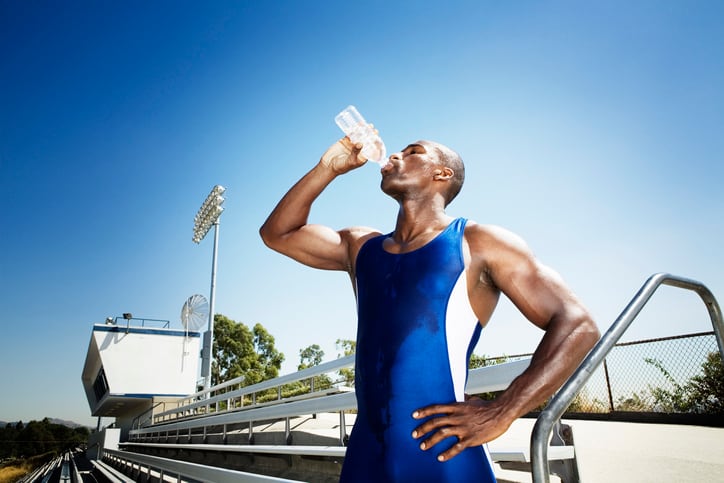The placebo-controlled, randomised, double-blind clinical trial compared two commercially available rehydration beverages and a placebo on the effect on rehydration in 26 athletic males after three 90 minute interval training sessions without drinking fluids.
The authors from Chicago, US, conclude: “Fluid retention during rehydration following exercise-induced dehydration of approximately 2.6% of body mass was superior in male athletes consuming 100% of fluid needs when beverages contained sodium and carbohydrate compared to drinking only water.”
Significance
Inadequate fluid intake during sports can lead to dehydration, and persistent dehydration at or beyond 2% of body mass has been shown to negatively impact athletic performance and increase risk of heat illness.
While rehydration is crucial, athletes often have limited periods to rehydrate between physical exertion.
To restore euhydration (the state of optimal total body water content as regulated by the brain) after exercise, it has been recommended that athletes ingest between 125 and 150% of the volume lost to sweat, to offset urine losses during the recovery preceding subsequent exercise.
Recovery time has been recommended at 4–6 hours, however often in competitive sports, this is unachievable.
Therefore, the composition of rehydration beverages can play an important role when time is lacking for the rehydration process.
Key ingredients in sports drinks that promote rehydration include sodium (Na) and carbohydrate (CHO).
Sodium helps maintain blood osmolality, which suppresses renal excretion of water and promotes fluid retention.
And hydration beverages with Na concentration of at least 40 mmol/L have previously been shown to help restore Na balance.
Beverages containing high CHO content have been reported to reduce plasma volume initially, likely due to slower gastric emptying because of the high energy density and/or osmolality of the hypertonic solution drawing water into the intestinal lumen.
However, one study found that a 2% CHO beverage, despite promoting greater plasma volume expansion initially, did not differ from water in fluid retention after 6 hours, but a 10% CHO beverage outperformed water.
The authors of the current study note: “The question that remains is whether variations in CHO concentrations of between 2 and 6% enhance rehydration when Na content also varies in the beverage.
“The lack of studies hinders decision-making by athletes and recommendations by sports nutritionists regarding beverage selection to optimise rehydration particularly as athletes chose to limit dietary CHO.
“The purpose of the study was to compare beverages that varied in both Na and CHO content within the range found in sports drinks for rehydration properties following exercise-induced dehydration in male athletes.”
Study
26 males of ages 18 to 30 y were recruited, consisting of intercollegiate athletes, club sport athletes, personal trainers, and former military personnel, all of whom trained regularly (>60 min a day at moderate to vigorous intensity, ≥3 d per week).
To induce 2.6% body mass loss (BML, p > 0.05 between treatments), participants performed three 90-minute interval training sessions without drinking fluids.
Post-exercise, participants replaced 100% of BML and were observed for 3.5 h for the fluid retained (%FR).
A water placebo was compared to one ORS containing 2.5% CHO and 45 mmol/L Na, and one standard sports drink containing 6% CHO and 18 mmol/L Na.
One-way ANOVA was used to compare pre-exercise body mass, amount (kg) of fluid loss, and % dehydration (change in body mass) and confirm each trial replicated the state and conditions of each participant for each experiment.
Results showed that the mean ± SD for the %FR at 3.5 h was 58.1 ± 12.6% (W), 73.9 ± 10.9% (SD), and 76.9 ± 8.0% (ORS).
The %FR for the ORS and SD were similar, and greater than the water placebo (W) (p < 0.05 ANOVA and Tukey HSD).
Two-way ANOVA revealed a significant interaction with the ORS having greater suppression of urine production in the first 60 min vs. W (SD did not differ from W).
The authors observed that by 3.5 h, the ORS and SD promoted greater rehydration than W, but the pattern of rehydration early in recovery favoured the ORS.
Results showed that fluid retention did not differ for either the ORS or sports drink at the end of 3.5 h, but both promoted more complete rehydration than the water placebo (ORS 32% and SD 27%).
Yet at the end of 3.5h recovery, participants did not achieve euhydration based on their initial body weight, and the authors explain that this could be due to “protocol design for which participants ingested 100% of fluid replacement needs.”
Journal: Nutrients
https://www.mdpi.com/2072-6643/15/22/4759
“Post-Exercise Rehydration in Athletes: Effects of Sodium and Carbohydrate in Commercial Hydration Beverages.”
Authors: by Nhu Q. Ly, Karrie L. Hamstra-Wright, and Craig A. Horswill.


